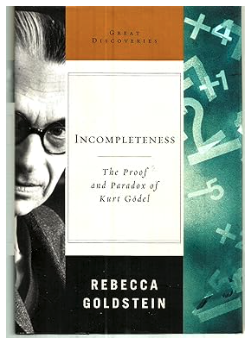I will state right from the start that this book and Gödel’s Incompleteness Theorem are far from my full comprehension: I’m glad I read it but confess to not fully understanding most of it. I ran across the theory while reading Mircea Cartarescu’s Solenoid and was intrigued with his application of the theory and its philosophical implications. In a nutshell and in my less than mathematical thinking, I understand incompleteness to state that there are objective truths that cannot be proven within that system and that if one fails to reach an objective truth there is a fault in one’s thinking, not in the truth itself. Goldstein’s example is the statement 5 +7 = 12. If one were to add 5 and 7 and arrive at 13, one can assume there is a problem with counting and not with the statement. Clear enough, but I got lost in Chapter 3 where Goldstein lays out the proof for this. Sill, there is something inherently attractive in the theorem and in its application to daily life and it is the reason I slowly worked my way through the book.
One useful application is in evaluating the current mess of constant lies, false ‘facts,’ and the rewriting of objective truths dominant in politics and social life. Its as if we now reject the existence of objective truths in favor of anything we want to create or manufacture to justify our behaviour. People have some bizarre beliefs and opinions and create new ‘truths’ to support those beliefs and opinions, rather than the other way around. Goldstein quotes Gödel in her epigraph: “But every error is due to extraneous factors (such as emotion and education); reason itself does not err.” It seems as if reason is today’s casualty in favor of subjective truths and errors.
I may be making a mistake in trying to apply Incompleteness to daily living, and granted my understanding is tenuous, but it seems like a worthy goal. A challenging book and enlightening reading about Gödel’s life outside of mathematics, especially his relationship with Einstein. A good brain teaser.
